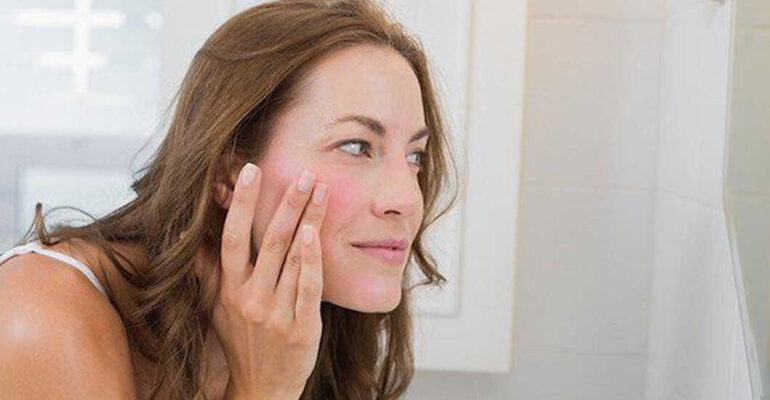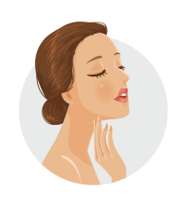Sensitive skin or Rosacea: Dermatologist Guide
August 31, 2021 2023-06-12 7:08Sensitive skin or Rosacea: Dermatologist Guide
As an Amazon associate, Dermatocare earns from valid purchase made by clicking on the affiliate links in this blog.

Sensitive skin or Rosacea: Dermatologist Guide
Sensitive skin is a common skin condition that affects up to 25% of the population. People with sensitive skin might get redness, burning, itching, and sometimes bumps.
Various factors, including sun exposure, harsh skincare products, stress, and environmental irritants, can trigger sensitive skin. A sensitive skincare routine focuses on calming and soothing the skin with gentle, fragrance-free products designed for sensitive skin.
What is rosacea?
Rosacea is a scientific term for sensitive skin. Rosacea is a chronic skin condition that affects the face. It is characterized by redness, flushing, telangiectasia (visible blood vessels), papules (small, raised bumps), and pustules (small, pus-filled bumps). The severity of rosacea can vary from person to person, and it can come and go.
There are four main types of rosacea:
- Erythematotelangiectatic rosacea: This is the most common type of rosacea. It is characterized by persistent redness on the face, often in the central area of the face, such as the cheeks, nose, and chin. In some people, small blood vessels (telangiectasia) may also be visible.
- Papulopustular rosacea: This type of rosacea is characterized by the presence of papules and pustules. Papules are small, raised bumps, and pustules are small, pus-filled bumps. Papulopustular rosacea is often mistaken for acne.
- Phymatous rosacea: This type of rosacea is characterized by thickening of the skin, especially on the nose. The nose may become enlarged and bulbous.
- Ocular rosacea: This type of rosacea affects the eyes. It is characterised by redness, itching, burning, and watering of the eyes.
How to calm sensitive skin?
Your sensitive skin is begging you for a break. It’s been through enough. All the harsh products, the harsh treatments, the harsh environment. It’s time to give it some TLC.
The first step is to stop all the products. Every single one. This may seem counterintuitive, but it’s the only way to give your skin a chance to heal. When you use harsh products, they can strip away your skin’s natural barrier, making it more sensitive and vulnerable.
Remember “whenever your skin is burning or irritated it is pleading leave me alone”
Sensitive skin deserves “minimum experimentation” and “maximum care”. Each time you get redness, burning or irritation, your skin is crying out loud “Do not irritate me, leave me alone.” Therefore, discontinue all the skin care products, cosmetics, and prescribed/not prescribed medicines.
So what can you do? Here’s a simple skincare routine that will help calm your sensitive skin.
Skin care routine for rosacea or sensitive skin
Sensitive skin can be a pain, but it doesn’t have to be. You can soothe your skin and return to normal with the right products and CTM routine. Here is a video that goes into more detail about the CTM routine:
STEP 1 Cleanser
The right cleanser that does not irritate sensitive skin is essential. Here are some key points to look for in your cleanser:
- Avoid bar soaps because they may increase pH and make your skin more sensitive. Instead use, liquid cleansers that match pH of skin.
- Your cleansers should not foam a lot because harsh surfactants like sodium lauryl/ Laureth sulphate can damage skin barrier further.
- Restrict cleansing to twice a day.
- Avoid overzealous cleansing because it can perturb the barrier of skin allowing irritants to penetrate easily.
- After washing, pat dry your face. Avoid rubbing because friction can provoke inflammation.
Recommended Brands
For oily to normal skin type:
For dry skin type:
- Vanicream Face Wash
- Cetaphil Gentle Skin Cleanser
- Neutrogena Ultra Gentle Cleanser
- Cerave Hydrating Cleanser
STEP 2: Rose water
Spray a good quality organic rose water on your face and massage it gently until absorbed. The idea is not to use rose water as toner, but to let it seep into your skin to soothe.
Recommended Brands
Most rose water contain harmful chemicals, for brand suggestion read this article, Pure and Organic Rose Water: Dermatocare Research
STEP 3: Moisturiser
A good moisturizer can help repair the skin barrier and restore the skin’s natural texture. When choosing a moisturizer, look for products that are labeled as “hypoallergenic,” “gentle,” “mild,” or “for sensitive skin.” However, it is important to note that these terms are not regulated by the FDA, so they do not guarantee that a product will be safe for everyone.
The frequency with which you should apply moisturiser depends on your skin type. People with oily skin can usually get away with applying moisturiser twice daily, in the morning and at night. On the other hand, people with dry skin may need to apply moisturiser more often, as often as every 2-3 hours. This will help replenish the natural moisturising factors lost from dry skin.
Here are some additional tips for choosing and using a moisturizer:
- Look for a moisturizer that is oil-free and non-comedogenic, which means it will not clog pores.
- Choose a moisturizer that contains ingredients that are known to be soothing and moisturizing, such as hyaluronic acid, glycerin, and shea butter.
- Avoid moisturizers that contain fragrances, dyes, or other harsh ingredients.
- Apply moisturizer to clean, dry skin.
- Massage the moisturizer into your skin until it is fully absorbed.
Recommended Brands
- Cera Ve Moisturising Cream has Glycerine, petrolatum, Sodium hyaluronate, cholesterol, ceramide, and water for deep skin nourishment for dry skin type.
- Bioderma Atoderma cream is another good choice for dry skin. It is available at Amazon. in and Amazon.com
- Cera Ve Moisturising lotion has Glycerine, petrolatum, Sodium hyaluronate, cholesterol, ceramide, and water for deep skin nourishment.
- Aveeno Skin Relief Moisturizing Lotion for normal skin type.
- Homemade moisturiser for sensitive skin: You can make soothing gel at home in 5 minutes with aloe vera, calendula and rose water. To know the recipe, click this link: Homemade Calendula and rose aloe vera gel. Here is a quick video on this recipe:
Ideal for oily to combination skin type
STEP 4: Sunscreen
Physical sunscreen is a better choice for people with sensitive skin than chemical sunscreen. Physical sunscreens sit on top of the skin and reflect UV rays, while chemical sunscreens absorb UV rays and convert them into heat. This can be irritating for people with sensitive skin.
It is important to apply sunscreen at least 30 minutes before going outside, regardless of whether you use physical or chemical sunscreen. This gives the sunscreen time to absorb into the skin and provide protection.
If physical sunscreen does not agree with your skin, you can avoid stepping out in bright sun and cover your face with thick cloth. Wide-brimmed hats and sunglasses can also help protect your skin from the sun.
Recommended brands:
- Aveeno Positively Mineral Sunscreen
- CeraVe Hydrating Sunscreen Face Lotion SPF 50
- Cera Ve Hydrating Mineral Sunscreen SPF 30 Face Sheer Tint
FAQs
What causes rosacea?
Rosacea can be due to following reasons:
The family history of allergies
You are likely to get rosacea if tendency of allergies in your family. One or several of your immediate blood relations might have
- asthma
- allergic rhinitis (present with frequent sneezing)
- allergic conjunctivitis (itching in eyes)
- atopic dermatitis (present with dry skin, rash and itching).
Experimentation
You can develop sensitive skin during lifetime if you treat your skin as guinea pigs. Lot of people believe in trying the latest, exposing it to harsh chemicals or procedures frequently. Check out, this list of products that are less likely to irritate your sensitive skin.
Severe and prolonged sun exposure
Few might develop sensitive skin after a long beach holiday in the tropical sun.
Steroid misuse
Still others, might develop it due to repeated use of steroid creams. This occurs when you self-medicate the steroid creams like Betnovate, lobate, cosvate, tenovate, etc. They clear your skin instantly, but flare-ups might occur on discontinuation. If such is your situation, a dermatologist can help you with the management of both steroid dependence and sensitive skin.
Idiopathic: However, there might not be any reason for having rosacea. In such cases, your face might get red on sun exposure even in childhood.
Which ingredients are good for sensitive skin?
Following anti-inflammatory ingredients can help in claiming your sensitive skin or rosacea:
- Aloe vera
- Arctiumlappa (burdock root)
- Chamomile
- Cucumber
- Dexpanthenol (provitamin B5)
- Glycyrrhiza glabra( liquorice extract)
- Niacinamide
- Red algae
- Rose water
- Silymarin
- Sulfacetamide
- Sulfur
- Zinc
We advise you to do a patch test before you start using any new product, even those recommended by us. You can do patch test by applying a small amount of product on behind your ear every night for at least five nights. Do not use product if redness, burning, itching, or rash occurs.
Which anti-ageing, acne or pigmentation ingredients are best for rosacea?
If your skin is not super-sensitive, then you can use following ingredients:
Anti-ageing: Peptide are better than retinoids
Can I scrub or exfoliate sensitive skin?
Scrubs might cause micro-trauma and induce inflammation in the sensitive skin; so preferably avoid them especially when your skin is irritated. Gentle scrubs meant for daily use can be used once a week or chemical peels can be tried, only under the supervision of a dermatologist. Among peels, milder agents like lactic acid or mandelic acid are preferred. Peels done once in a month by an experienced dermatologist is an excellent way to remove dead skin layer and rejuvenate your sensitive skin.
How does rosacea differ from acne?
It is very important to differentiate rosacea in the papulopustular stage from acne because the anti-acne medication can aggravate rosacea. I see a lot of patients with Rosacea taking anti-acne products, remedies and even medications that can harm their skin. I have tabulated the differences between rosacea and acne below:
| Rosacea | Acne |
|---|---|
| No black/whiteheads | Black/whiteheads are common |
| Red or pus filled spots are not painful | Red or pus filled pimples are usually painful. |
| Skin gets red, burn or irritate on exposure to the sun, hot tea or coffee, and harsh products like toners, bleach, sunscreen, | Skin does not get red on exposure to the sun, hot food or skin care products. |
| Anti-acne treatment, products and home remedies make rosacea even worst. | Anti-acne treatment, products and home remedies are helpful. |
Rarely, you might have both rosacea and acne, in this cases, you should consult your dermatologist to craft your skin care regim
What should I avoid in sensitive skin?
The best solution is to stick to the skin care products that already suit you. In quest of finding better, you might end up in worst. Anything that causes irritation, itching burning, bumps or redness should be avoided, for example:
- Skin care products like:
- alcohol-based toners
- bar soaps that produce a lot of lather
- nutshell based scrubs
- hair removal creams containing chemical depilatories
- Ingredients like:
- Additives in skin care products like fragrances, lanolin, propylene glycol, Sodium Lauryl/ Laureth sulphate(in face wash), preservatives like quaternium 15, etc.
- Active ingredients like Benzoyl Peroxide, Glycolic Acid, Hydroquinone, pure form of Vitamin C, sandalwood, arnica, essential oils, tea tree oil, etc. Take a note that the list includes natural ingredients as well.
- Sunscreen agents like Avobenzone, Benzophenone, Butyl methoxy dibenzoyl methane, Isopropyl dibenzoyl methane, Methyl benzylidene camphor, Octyl methoxy cinnamite, Para-aminobenzoic acid (PABA), Phenylbezimidazole sulfonic acid.
- Parlour procedures
- hot wax/saunas/steam
- overzealous scrubbing during facials,
- hair treatments that involve heat or harsh chemicals.
- Aesthetic procedures
- strong chemical peels
- Micro-dermabrasion
- Ablative LASERS
- Lifestyle
- hot and spicy food,
- hot environment,
- moving out in the mid-day sun,
- drinking alcohol,
- strong emotional triggers
- cooking food in hot climate
When should I visit Dermatologist?
People with sensitive skin should always visit their Dermatologist to understand the cause and also for recommendations on an appropriate skin care regime. Re-visit is needed if:
- There is persistent redness, burning or irritation of the skin that does not subside even after removing the triggers.
- If your skin is developing red bumps or pimples, that fail to resolve with above measures.
- If sensitive skin is due to rosacea, regular check ups are required as directed by a physician.
- Any severe outbreak of sensitive skin should ideally be reported to a physician for understanding the reason behind it and for the treatment.
ROUTINE FINDER
Get free dermatologist-recommended regime by choosing your skin or concerns.

FACE

HAIRS

CHILD

BODY
